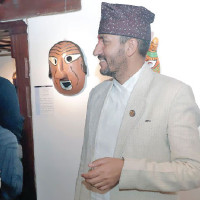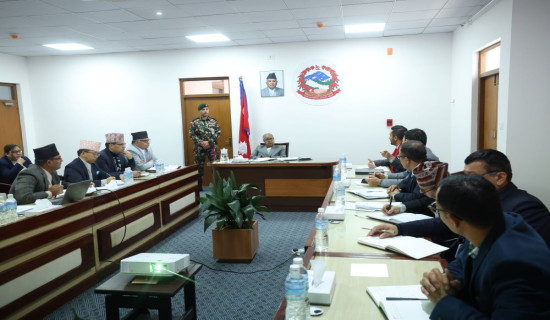- Tuesday, 9 December 2025
Guide To Parliamentary Reporting
Since the primary 'Acta Diurna' (or daily acts in Latin) was published or distributed in Rome in 59 BC, and the speed brought about by Johannes Gutenberg's revolutionary invention of the modern printing technology called moveable type during the mid-15th century, journalism has come a long way to be a highly specialised and technical profession.
In the past, more than three centuries since the publication of the pioneering 'Relation of Strasbourg' and 'Avisa Relation oder Zeitung' in the early 17th century in Europe, journalism mostly remained a sacred profession that would work to report the events, catering to the elite or ruling classes in affluent European countries and elsewhere. However, as the Industrial Revolution in Europe began to catch up, literacy and income of people went up rapidly, increasing the demand for newspapers. It resulted in higher circulation and price reduction, which heralded an era of the 'Penny Press,' bringing down the newspaper cover price from 6-Penny to 1-Penny.
This boom created a need for specialised reporting, and consequently, 'beats' were made in reporting where a journalist would cover an exclusive sector like politics, parliament, business, entertainment, or society. With this, journalists started to become expert-like in their respective beats.
In Nepal, journalism was like 'one man's profession' till the end of the Panchayat regime. With the restoration of democracy in 1990, the country entered into economic liberalisation, while the parliament guaranteed the freedom of the press and freedom of opinion and expression. This promoted a rapid growth in the media sector. With the entry of corporate media into the scene, journalism became advanced, and multiple beats were effectively implemented.
At the same time, while the parliament of the Rastriya Panchayat was more like a 'ceremonial' tool for the king, it was an actual legislative body that could strike a balance with the other two organs of the state—the judiciary and government. It was natural that the attention of the media and journalists would be drawn to this institution. So, parliamentary affairs was established as one of the prominent beats.
In response to this scenario, the Journalists Society for Parliamentary Affairs (JSPA) presented the gradual evolution of parliamentary practices and media reporting in a recently published book. The handbook on 'Parliamentary Reporting: Principles and Practices' delves into the principles and practices of parliamentary reporting.
Written by a group of 13 journalists having good experience in reporting the parliamentary affairs and edited by Narayan Kafle and Manoj Satyal, this book features 12 chapters on parliament, the law-making process, the operation of the parliament, the role of parliamentarians and House committees, the formation of the government, open parliament, parliamentary surveillance, and international practices in parliamentary reporting.
Edmund Burke, a parliamentarian from the United Kingdom, coined the term 'Fourth Estate,' referring to the press, reminding the media of the responsibility to check the three estates of the nation, should there be a
need. This 'Fourth Estate' is responsible not only for reporting the activities in the parliament or of the lawmakers but also for informing the law-making process and explaining and interpreting the laws enacted by the parliament.
While the parliament checks and balances with the other two state organs—the government and the court—the press, through its reporting, analysis, and interpretation, can constantly remind this important institution about its roles and responsibilities.
The book begins with the history of parliament in Nepal. It provides a brief timeline of the formation and dissolution of parliament in 1958 and 1990 and onwards, the restoration of parliament in 2006, the constitutional assembly, and the legislative branch of the republic. Readers can update themselves on the major parliamentary activities that have happened in Nepal since 1958, as well as the structure of the House of Representatives and the National Assembly. The process of lawmaking and its stages have been discussed in detail, helping the readers with all possible information concisely. They also find a chapter on 'Ordinance: Concept and Use' interesting and relevant, given the recent discourse on various ordinances implemented by the government and opposed by the opposition parties.
The book by the JSPA can be both a resource book for journalists and a reference book for all who are interested in the journalism sector. Since the fundamentals of parliamentary reporting are explained in detail, journalists wishing to make their careers in this beat can train themselves with the knowledge and skills presented in the book. Students of journalism and journalists who do not cover parliament can immensely benefit from the book. It constantly reminds journalists to monitor the parliament and House panels regularly and to surveil their exercise processes.
It makes the journalism more responsible, the lawmakers and the government more transparent and accountable, and the public more informed.
The book on 'Parliamentary Reporting' provides journalists with guidelines on accurately reporting parliamentary proceedings, laws, and policy decisions, ensuring that the public receives reliable and fact-based information. Only well-trained and skilled journalists can effectively scrutinise parliamentary debates, budget allocations, and policy decisions. If this could be achieved, it could enhance accountability and transparency in parliament and, consequently, government. An annex on the key terminologies of the parliament and reporting is an added attraction of the book.
(Dhakal is a journalist at The Rising Nepal.)
















